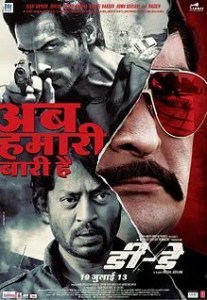This is a review of the version of Crakk streaming on Hulu, which has a runtime of 2 hours 12 minutes — 22 minutes shorter than the theatrical version’s 2 hours 34 minutes.
“Two hundred hungry dogs, and the contestants on rollerblades.” If this sounds like a good time — and it does to me — Crakk: Jeetegaa Toh Jiyegaa! is for you.
Vidyut Jammwal plays extreme sports enthusiast Siddhu. He films himself doing parkour stunts like jumping over an empty elevator shaft in an unfinished high-rise, hoping to catch the attention of recruiters at Maidaan — a competition that’s part Squid Game and part Fast & Furious. It’s also where Siddhu’s older brother Nihal (Ankit Mohan) died in an accident during the final round four years earlier.
Siddhu gets the call-up and soon finds himself in an abandoned castle in Poland with thirty-one other competitors from around the world. There’s a blond “American” guy with an Eastern European accent and a guy named Alphonso representing all of Africa. Fans of Maidaan watch the competition online and place bets on the winner. Half the field advances through three rounds before a champion gets the chance to face off against Maidaan’s emcee, Dev (Arjun Rampal).
The contestants either don’t realize or don’t care that when you lose in Maidaan, you die. Sure, one guy gets run over by a remote-controlled go-kart, but the other losers of Round 1 wind up dead, too. The Netflix series Squid Game highlights the economic desperation that would drive people to risk their lives. If the contestants who turn up at Maidaan are desperate for anything other than thrills, we don’t hear about it.
Even more inexplicable is the Round 2 dog/rollerblade challenge, in which each contestant is paired with someone who is not a part of the contest but is good on skates. Why would any of the rollerbladers agree to be mauled by hungry dogs?
It makes as much sense as Dev dealing plutonium as a side hustle. The bad guys in these Fast & Furious-type movies always use racing or competition as a cover for more nefarious crimes, so I guess it’s to be expected in Crakk. The plutonium puts Dev on the radar of Officer Patricia Novak (Amy Jackson) of a vague international police agency. (One would think a televised sporting event with a 97% fatality rate would be enough to warrant an investigation, but apparently not.)
Patricia teams with Siddhu to get the dirt on Dev’s dirty deals in exchange for information on what really happened to Siddhu’s brother, Nihal. Other characters of note include Maidaan’s beautiful social media coordinator Alia (Nora Fatehi) and Maidaan’s tech support person Junaida (Jamie Lever). Both of them seem okay working for an organization that kills a lot of people. Maybe Maidaan offers really good health insurance.
Crakk has many logical flaws, but none of them matter. This is a dumb action movie that aspires to be a dumb action movie and meets its goals, sans themes or social commentary. The early elevator-jumping scenes are shot really well, and the games are ridiculous but fun. Rampal seems to enjoy himself as the king of a bloody kingdom, and Jammwal’s acting is actually quite good. Siddhu regularly hallucinates conversations with Nihal, only for Siddhu and the audience to eventually see that he’s alone. Jammwal pulls off a challenging scene in which he’s essentially arguing with empty air on a dreary Polish street late one night.
The aesthetics of the world writer-director Aditya Datt created for Crakk are amusingly bonkers. Large crowds show up in the middle of the desert (yes, Poland has a desert) to watch the games, dressed in embarrassing costumes that look sourced from a Halloween store’s clearance bin. CGI fills in areas where the filmmaker didn’t want to pay for extras, complete with cheering fans and random sports cars a la Fast & Furious (but no tents or bathrooms or other facilities). All of Dev’s pasty henchmen are shirtless under their bulletproof vests.
Of course, Siddhu and Dev have a fight scene in which both of their shirts are ripped off. The movie would feel incomplete without it.
Links






